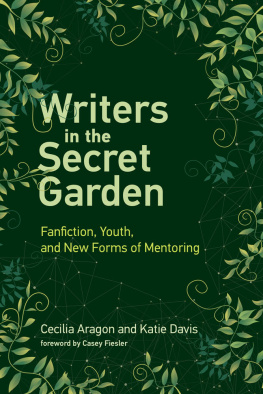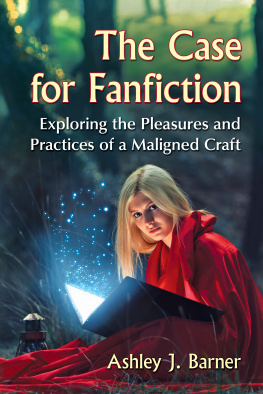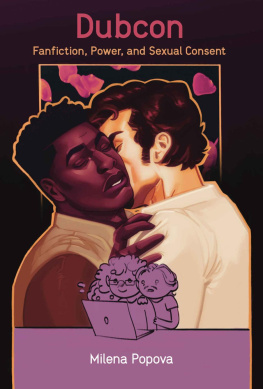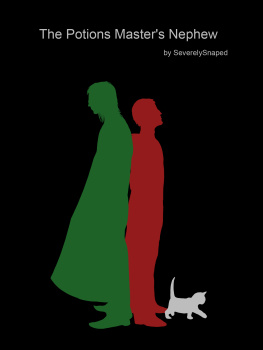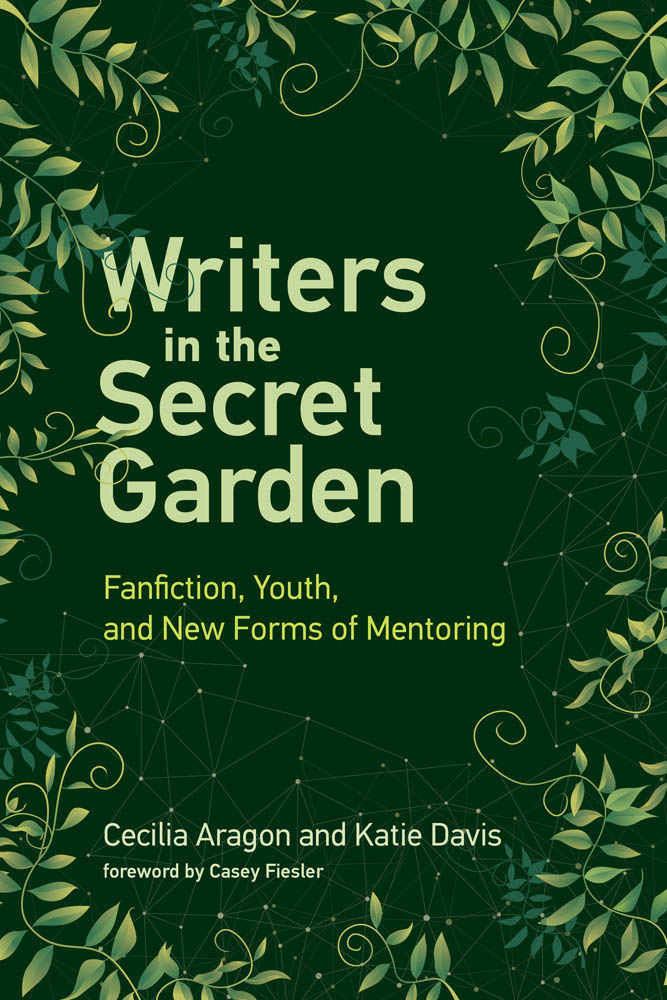
Writers in the Secret Garden
Learning in Large-Scale Environments
Justin Reich and Nichole Pinkard, editors
Writers in the Secret Garden: Fanfiction, Youth, and New Forms of Mentoring, Cecilia Aragon and Katie Davis, 2019
Writers in the Secret Garden
Fanfiction, Youth, and New Forms of Mentoring
Cecilia Aragon and Katie Davis
The MIT Press
Cambridge, Massachusetts
London, England
2019 Cecilia Aragon and Katie Davis
All rights reserved. No part of this book may be reproduced in any form by any electronic or mechanical means (including photocopying, recording, or information storage and retrieval) without permission in writing from the publisher.
This book was set in ITC Stone Serif Std and ITC Stone Sans Std by Toppan Best-set Premedia Limited. Printed and bound in the United States of America.
Library of Congress Cataloging-in-Publication Data is available.
ISBN: 978-0-262-53780-3
10 9 8 7 6 5 4 3 2 1
For Dave, Diana, and Ken
For our students, who make coming to work every day a joy
For all the fanfiction authors, who inspire us with their creativity and willingness to share
d_r0
Contents
Casey Fiesler
Series Foreword
Learning across the life span is more important than ever, and with the wealth of resources and communities available online, there has never been a better time to be a learner. Learners of all agesin formal and informal settingsare turning to online tools to help them develop new skills and knowledge for work, school, and leisure. The field of large-scale learning engages in the study of networked environments with many, many learners and few experts to guide them.
Large-scale learning environments are incredibly diverse: massive open online courses (MOOCs), intelligent tutoring systems, open learning courseware, learning games, citizen science communities, collaborative programming communities, community tutorial systems, social learning networks, and countless informal communities of learners on platforms such as Reddit, YouTube, and fanfiction sites. These systems either depend upon the direct participation of large numbers of learners in a single instance, or they are enriched by continuous improvement based on analyzing data generated by many learners over time. They share a common purposeto increase human potentialand a common infrastructure of data and computation to enable learning at scale.
Technologies for large-scale learning are sometimes built deliberately, as in the case of MOOC platforms, and they are sometimes adapted from technologies originally developed for other purposes, as in the case of video-sharing sites. In some cases, they are used by individual learners around the world, and in other cases, large-scale learning environments are embedded within more traditional and small-scale educational systems such as classrooms and schools. They can be used to foster human capacity and create new opportunities, but they can also be used to teach and spread hateful ideologies. With a capacious enough definition of learning, large-scale learning technologies are implicated in nearly every part of the human experience in the networked world, from schooling to professional learning to politics to health care and beyond.
The Learning in Large-Scale Environments series from the MIT Press seeks to investigate, critique, and explain these large-scale environments and the various ways they are hybridized with residential learning space. Just as large-scale learning environments are diverse, our series includes books with a diverse set of methodological and theoretical perspectives, ranging from learning science to computer science to sociocultural research traditions. The series examines large-scale learning environments at multiple levels, including technological underpinnings, policy consequences, social contexts and relationships, learning frameworks, and the experiences of educators and learners who use them. Our hope is that researchers will find valuable contributions to the scholarly literature and that educators and policy makers will find useful insights as they consider how best to support the learning needs of students of all ages around the world.
Justin Reich
Nichole Pinkard
Series Editors, Learning in Large-Scale Environments
Foreword
Casey Fiesler
Its easy to focus on all the terrible things that networked technologies have brought into our livesmisinformation, harassment, polarization, automated inequality. These are all things that pull us farther apart rather than bring us together, but it doesnt have to be that way. This book describes one such counternarrative, an example of how the same affordances of the internet that allow for those negative experiences have also created and nurtured a positive community that has touched countless livesincluding mine.
When I first logged on to AOL as a teenager in the mid-nineties, one of the first things I remember searching for in this exciting new online world was Star Trek. From AOL I stumbled onto Usenet, and then alt.startrek.creative, and thats where I discovered fanfiction. It felt like something clicked into place for me; through sharing my own Star Trek stories, I found a writing community and, in fact, a learning community. I didnt have the words to describe it then, but the positive feedback that helped me grow as a writer was an example of the distributed mentoring described in this book.
As the internet became an increasingly important part of our lives, it also became an important topic for scholarly research that teaches us not only about technology but also about our world and ourselves. From communication to education to computer science and beyond, a variety of academic fields have explored how online platforms such as Wikipedia, Stack Overflow, and Scratch serve as communities where people can share, learn, and connect. As I moved through research communities myself, I was surprised not to see more people paying attention to fanfiction writers and readers as another remarkable example of an online communityone that might even have lessons for how to make our other networked spaces more welcoming and positive.
So when I first saw Cecilia Aragon presenting some of her and Katie Daviss first work on this topic, a detailed ethnography subtitled Thousands of Positive Reviews, I wanted to jump up and down for joy. They had captured precisely what I thought everyone needed to know about fanfiction communitiesthe positivity, the learning experiences, the social benefits, and more. The type of mentorship they describe was something I experienced myself, improving my own writing with the help of constructive feedback and, even more importantly, encouragement. I have a number of friends who are now successful published authors and who got their start in fanfictionand more still who are writing fanfiction read by tens of thousands of people.
The concept of distributed mentoring described in this book captures what makes online fanfiction communities such ideal spaces for informal learning. The sheer abundance of feedback, the variety of perspectives, the cumulative nature of learning, the persistent availability of experiences to learn from, and the positive norms surrounding critique have all evolved from the combination of the culture of fanfiction and the affordances of networked technologies. Taken together, those thousands of positive reviews have contributed to the education and support of countless young people who have improved their writing and made important social connections while doing so.
Next page
